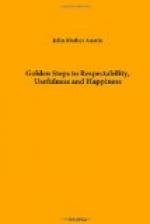For the following excellent suggestions in regard to the study of the Scriptures, I am indebted to a popular writer of the present day.
“On the Sabbath the Bible should be studied. Every person, old or young, ignorant or learned, should devote a portion of time every Sabbath to the study of the Scriptures, in the more strict and proper sense of that term. But to show precisely what I mean by this weekly study of the Bible, I will describe a particular case. A young man with only such opportunities as are possessed by all, resolves to take this course. He selects the Epistle to the Ephesians for his first subject; he obtains such books and helps as he finds in his own family, or as he can obtain from a religious friend, or procure from a Sabbath-school library. It is not too much to suppose that he will have a sacred Atlas, some Commentary, and probably a Bible Dictionary. He should also have pen, ink, and paper; and thus provided, he sits down Sabbath morning to his work. He raises a short but heartfelt prayer to God that he will assist and bless him, and then commences his inquiries.
“The Epistle to the Ephesians I have supposed to be his subject. He sees that the first question evidently is, ’Who were the Ephesians?’ He finds the city of Ephesus upon the map; and from the preface to the Epistle contained in the commentary, or from any other source to which he can have access, he learns what sort of a city it was—what was the character of the inhabitants, and if possible, what condition the city was in at the time this letter was written. He next inquires in regard to the writer of this letter or Epistle, as it is called. It was Paul; and what did Paul know of the Ephesians? had he ever been there? or was he writing to strangers? To settle these points, so evidently important to a correct understanding of the letter, he examines the Acts of the Apostles, (in which an account of St. Paul’s labors is contained,) to learn whether Paul went there, and if so, what happened while he was there. He finds that many interesting incidents occurred during Paul’s visits, and his curiosity is excited to know whether these things will be alluded to in the letter; he also endeavors to ascertain where Paul was when he wrote the letter. After having thus determined everything relating to the circumstances of the case, he is prepared to come to the Epistle itself, and enter with spirit and interest into an examination of its contents.
“He first glances his eye cursorily through the chapters of the book, that he may take in at once a general view of its object and design—perhaps he makes out a brief list of the topics discussed, and thus has a distinct general idea of the whole before he enters into a minute examination of the parts. This minute examination he comes to at last—though perhaps the time devoted to the study for two or three Sabbaths is spent in the preparatory inquiries.




